初中英语人教版八年级下册Unit5课件
初中八年级英语下册一般将来时的表达课件

How can we express the Simple Future Tense
Ⅱ.一般将来时的五种表达方式:
3. be doing sth 表将来 现在进行时表示即将发生的动作,多与表示位移的动词come, go, arrive, leave fly, start等连用。 如: She is leaving for Beijing.(她就要启程去北京。leave for启程,动身)
1.当表示主观方面“打算, 准备” 去做什么事情的时候, 往往用be going to +动词原形, 而will 则多用来表示纯属客观的将来。
2.be going to+动词原形可表示事先计划的意图,而 will 则表示说话人当时决定的意图。
How can we express the Simple Future Tense Do some exercises
一般将来时的结构总结 Ⅲ.There be 句型的一般将来时:
2. There will be
肯定式: There will be+sth.
否定式: There will not be+sth.
一般疑问式: ——Will there be+sth?
(肯)——Yes, there will.
(否)——No, there will not.
–________ (好的). Yes, please B.Yes, you will.C.No, please.D.No, you won’t. 4.– Will his parents go to see the Terra Cotta Warriors tomorrow?
– No, ________ (不去). A.they willn’t.B.they won’t.C.they aren’t.D.they don’t.
英语人教版八年级下册unit5精品PPT课件 图文
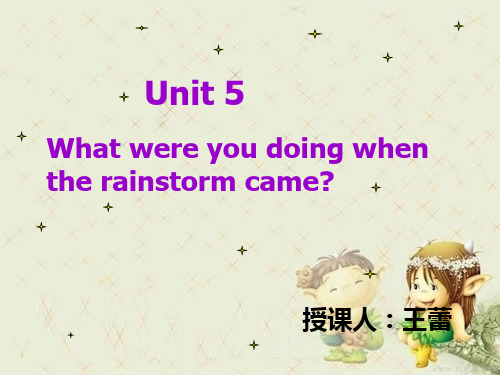
2. When the teacher came in,Lily was reading aloud.
=While Lily was reading aloud, the teacher came in.
when “当…..时候”
questions by using “was/were +
doing”.
What was your sister
doing at the time of the
rainstorm?
She was reading at home.
What was your brother doing at the time of the rainstorm?
Unit 5
What were you doing when the rainstorm came?
授课人:王蕾
One of students stand in front of the class,the teacher shows students verb phrases,he/she act it out, and the other students guess “What is he/she doing?”
1a Where were the people at the time
of the rainstorm? Match the
statements with the people in the
picture.
在……的时候
1a Where were the people at the time of the rainstorm? Match the statements with the people in the picture.
人教版八年年级英语下册 Unit 5 What were you doing when the rainstorm came
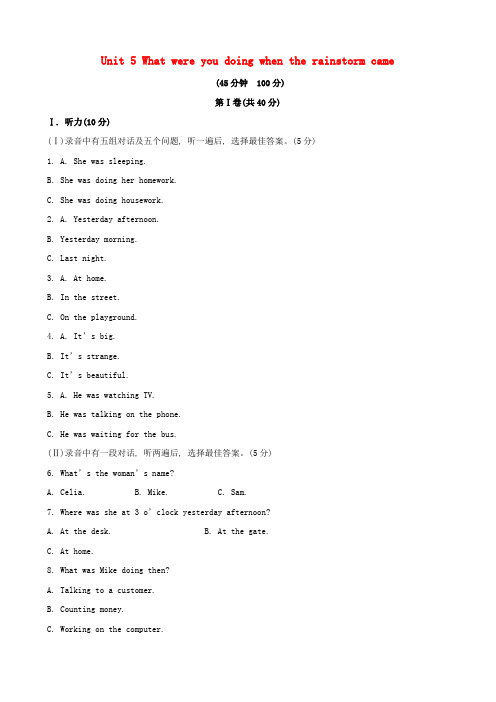
Unit 5 What were you doing when the rainstorm came(45分钟100分)第Ⅰ卷(共40分)Ⅰ. 听力(10分)(Ⅰ)录音中有五组对话及五个问题, 听一遍后, 选择最佳答案。
(5分)1. A. She was sleeping.B. She was doing her homework.C. She was doing housework.2. A. Yesterday afternoon.B. Yesterday morning.C. Last night.3. A. At home.B. In the street.C. On the playground.4. A. It’s big.B. It’s strange.C. It’s beautiful.5. A. He was watching TV.B. He was talking on the phone.C. He was waiting for the bus.(Ⅱ)录音中有一段对话, 听两遍后, 选择最佳答案。
(5分)6. What’s the woman’s name?A. Celia.B. Mike.C. Sam.7. Where was she at 3 o’clock yesterday afternoon?A. At the desk.B. At the gate.C. At home.8. What was Mike doing then?A. Talking to a customer.B. Counting money.C. Working on the computer.9. What time did the woman leave the bank?A. At 10: 00 p. m.B. At 5: 00 p. m.C. At 4: 30 p. m.10. How many people were there in the bank?A. Three.B. Six.C. Seven.Ⅱ. 单项选择(10分)1. I bought alarm clock last week.A. aB. anC. theD. /2. —Mary called you this morning. But nobody answered.—Sorry. I the flowers in the garden.A. am wateringB. was wateringC. waterD. watered3. (2013·聊城中考)It was reported that nine Chinese people in a balloon crash(坠毁)in Egypt on February 26, 2013.A. are killedB. were killedC. will killD. have killed4. Please call me as soon as you the USA.A. get toB. reach toC. arrive atD. come5. —Jenny was doing her homework at ei ght o’clock last night.—You are . I saw her in the cinema at that time.A. hard-workingB. kiddingC. kidD. kidded6. —Could you tell me what he said just now?—Sorry, I what was happening outside.A. had thoughtB. was thinkingC. thoughtD. think7. —I was at the cinema at nine yesterday evening. What about you?—I books.A. am readingB. was readingC. will readD. had read8. —What were you doing it was raining?—I was reading a book.A. beforeB. ifC. whileD. after9. Paul walked into the bedroom because his wife and baby were sleeping.A. silentB. silenceC. in silenceD. loudly10. During the past two years, several earthquakes in different places of the world.A. happenB. happenedC. take placeD. took placeⅢ. 完形填空(10分)Evening came. It was time for Mr. Bell to close his shop. He was checking his money. His son Tom, who was 15, had just gone outside to buy a piece of newspaper. Just then, a big man walked 1 the shop. He had a gun(枪)in his hand.When Tom came back, he could hear the man asking his father for 2 . Tom could see the gun in the man’s hand, but the man didn’t 3 or hear Tom.Tom hurried up to the street. He looked for the police, 4 he didn’t find anyone. Then Tom saw an old baseball bat(棒球球棒) 5 in the street. “Maybe this will help, ”he thought. He ran 6 with it.His father was just giving some of the money to the man. The man was watching Tom’s father. Tom knew he could not 7 long. “Now is the time. I must do it now. ”Tom went up to the man and knocked him down 8 the bat.Tom and his father then ran outside. This time they found the 9 and told them what had happened. The police 10 went to the shop and caught the man.1. A. out of B. around C. into D. down2. A. paper B. water C. money D. food3. A. know B. catch C. meet D. see4. A. but B. so C. for D. or5. A. lies B. to lie C. lying D. is lying6. A. back B. over C. away D. past7. A. hold B. wait C. rest D. watch8. A. by B. from C. without D. with9. A. neighbors B. policeC. friendD. children10. A. quick B. slow C. quickly D. slowlyⅣ. 阅读理解(10分)It was raining heavily as I was walking up the hill towards the station at six o’clock on a Saturday morning. At this early hour there wasn’t much traffic and there weren’t many people. Just as I was crossing the road near the top of the hill, a car came around the corner. It was traveling very fast. Suddenly it hit a lamp post(路灯柱)and turned over.I ran to the car to help the driver at once. He was badly hurt and there was a lot of blood on his face. A young woman hurried into the station and phoned for an ambulance(救护车)while I took care of the driver. Many people came to see what happened. A policeman arrived a few minutes later and asked me a lot of questions about the accident. After a while the ambulance arrived and the driver was sent to the hospital.On Monday morning I went to the hospital to see the man. The doctor told me that he was much better, and he would leave the hospital after a few days’rest.1. Where did the accident happen?A. Near the school.B. Near the top of the hill.C. In the school.D. Near the hospital.2. What happened to the driver?A. He drove the car very well.B. His car hit a lamp post.C. His car turned over.D. Both B and C.3. Who hurried into the station and phoned for an ambulance?A. The writer.B. A policeman.C. Some people.D. A young woman.4. What did the policeman do?A. He took the driver away.B. He sent the driver to the hospital.C. He asked the writer a lot of questions.D. He phoned for an ambulance.5. Was the driver dead at last?A. Yes, he wasn’t.B. No, he was.C. Yes, he was.D. No, he wasn’t.第Ⅱ卷(共60分)Ⅴ. 词汇运用(10分)(Ⅰ)根据句意及首字母或汉语提示完成单词。
人教版英语八年级下册Unit 5 精品课件
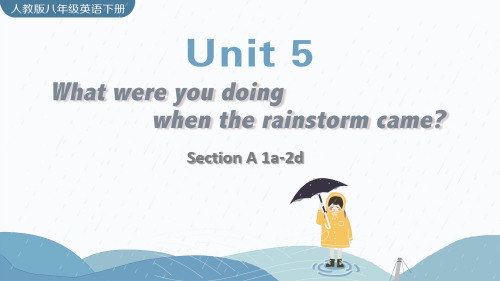
1c
Talk about what the people in 1a were doing at the time of the rainstorm.
A: What was the girl doing at the time of the rainstorm?
B: She was ...
➢ Pair work
rainstorm What were you doing when the rainstorm came?
What were you doing when the rainstorm came? I was wating TV when the rainstorm came.
What was he doing when the rainstorm came? He was sleeping when the rainstorm came.
Where were they doing when the rainstorm came?
They were waiting for the bus.
What was she doing when the rainstorm came?
She was reading in the library when the rainstorm came.
2a Listen and number the pictures [1-5].
4
1
5Байду номын сангаас
3
2
2b
Listen again. Fill in the blanks in the sentences in 2a.
1. My alarm didn’t go off so I _w__o_k_e_ up late. 2. I _r_a_n_ to the bus stop but I still missed the bus. 3. I __w_a_s__w_a__it_i_n_g__ for the bus when it began to
人教版初中英语八年级下册UNIT5考点汇总
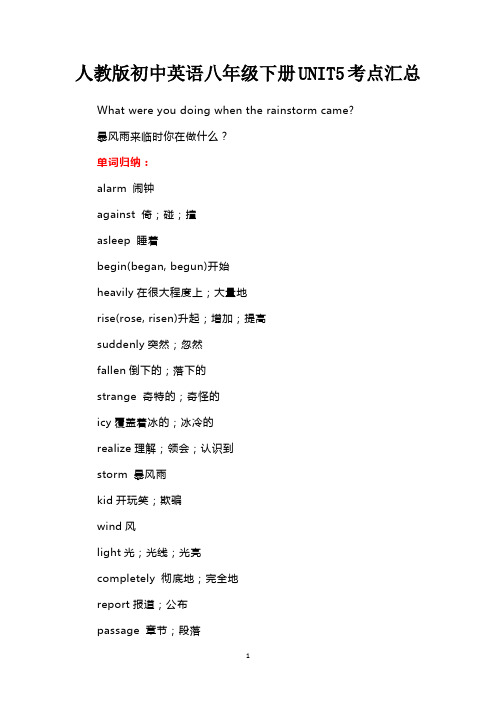
人教版初中英语八年级下册UNIT5考点汇总What were you doing when the rainstorm came?暴风雨来临时你在做什么?单词归纳:alarm 闹钟against 倚;碰;撞asleep 睡着begin(began, begun)开始heavily在很大程度上;大量地rise(rose, risen)升起;增加;提高suddenly突然;忽然fallen倒下的;落下的strange 奇特的;奇怪的icy覆盖着冰的;冰冷的realize理解;领会;认识到storm 暴风雨kid开玩笑;欺骗wind风light光;光线;光亮completely 彻底地;完全地report报道;公布passage 章节;段落wood木;木头recently不久前;最近window窗;窗户silence沉默;绒默;无声match火柴truth 实情;事实beat(beat, beat)敲打;打败date日期;日子短语归纳right away立刻;马上pick up 接电话go off(闹钟)发出响声take down拆除;往下拽;记录make one's way前往;费力地前进die down逐渐变弱;逐渐消失take shower洗淋浴tell the truth 说实话in silence沉默;无声in mess凌乱不堪;乱七八糟clean up 打扫干净point out 指出用法归纳1. be busy doing sth. 忙于做某事2.see sb./sth. doing sth.看见某人/某物正在做某事3.begin/start to do sth.开始做某事4.try to do sth.努力做某事5.It's+adj.+to do sth. 做某事是……的。
6.have trouble(in)doing sth. 做某事有困难或麻烦人教版(新标准)初中英语知识点精析八年级下册UNIT5What were you doing when the rainstorm came?暴风雨来临时你在做什么?重点●熟练运用谈论过去事情的交际用语●掌握过去进行时难点过去进行时的构成、基本句式及用法语法过去进行时Section A重点单词alarm 闹钟begin开始heavily在很大程度上;大量地suddenly突然;忽然strange 奇特的;奇怪的storm 暴风雨light光;光线;光亮wind风report报道;公布area地域;地区wood木;木头window窗;窗户match火柴beat敲打;打败against 倚;碰;撞asleep 睡着rise升起;增加;提高fallen倒下的;落下的icy覆盖着冰的;冰冷的kid开玩笑;欺骗重点短语go off(闹钟)发出响声fall asleep进入梦乡die down逐渐变弱pick up 接电话at first起初;起先have a look看一看重点句型1. What were people doing yesterday at the time of the rainstorm?昨天暴风雨时人们在做什么?2. So while you were sleeping, I called Jenny and she helped me.因此在你睡觉的时候,我打电话给珍妮,她帮了我。
初中英语人教版八年级下册unit 5 2b

全体快速默读
马丁· 路德· 金(1929年1月15日—— 1968年4月4日), 著名的美国民权运动领 袖。 1963年, 马丁•路德•金觐见了约翰 逊总统, 要求通过新的民权法, 给黑人 以平等的权利。
1963年8月28 日, 发表了《我有一个 梦想》的演说。1964年获得诺贝尔和 平奖。1968年4月, 马丁· 路德· 金前往 孟菲斯市, 领导工人罢工后,被人刺杀, 年仅39岁。1986年起, 美国政府将每年 1月的第三个星期一, 定为马丁· 路德· 金 全国纪念日。
成果展示
姓名 薛嘉伦 宋佳音 贾亦卓 做题时长 7'50 0'47 16'50 总分 100 100 100
张齐华
杨宇昊 常思源 吕欣欣 黄梁宇 任小宇 王晓月 杜亚怡 李欣冉 白玉杨 张梦蕾 张烨彤 杨亦昊
0'35
5'34 4'42 3'11 3'31 3'04 2'03 18'59 2'32 1'34 1'00 2'46 0'48
举手回答
3. 那时我完全被震惊了。 was ___________ completely At that time I _____ shocked _________. 4. 那天对你有意义吗? Does that day _____ have __________ meaning ____ to you?
3. I called you just now, but you weren’t in. A -----oh, sorry. I _______outside. A. was taking a walk B. talked with my friend C. went shopping
英语人教版八下5单元课件
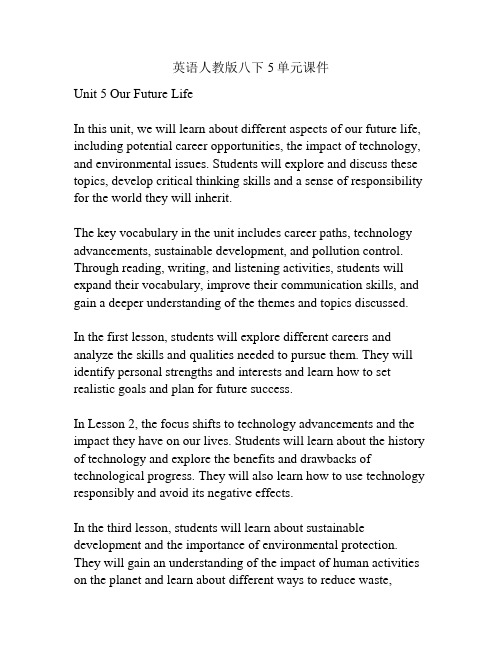
英语人教版八下5单元课件Unit 5 Our Future LifeIn this unit, we will learn about different aspects of our future life, including potential career opportunities, the impact of technology, and environmental issues. Students will explore and discuss these topics, develop critical thinking skills and a sense of responsibility for the world they will inherit.The key vocabulary in the unit includes career paths, technology advancements, sustainable development, and pollution control. Through reading, writing, and listening activities, students will expand their vocabulary, improve their communication skills, and gain a deeper understanding of the themes and topics discussed.In the first lesson, students will explore different careers and analyze the skills and qualities needed to pursue them. They will identify personal strengths and interests and learn how to set realistic goals and plan for future success.In Lesson 2, the focus shifts to technology advancements and the impact they have on our lives. Students will learn about the history of technology and explore the benefits and drawbacks of technological progress. They will also learn how to use technology responsibly and avoid its negative effects.In the third lesson, students will learn about sustainable development and the importance of environmental protection. They will gain an understanding of the impact of human activities on the planet and learn about different ways to reduce waste,conserve resources, and minimize pollution.In the final lesson, students will synthesize their learning by creating a vision for their future life. They will consider their career goals, the role of technology in their lives, and their responsibility to the environment.Throughout the unit, students will engage in dynamic and interactive activities designed to enhance their learning experience. These include group discussions, presentations, research projects, and simulations. By the end of the unit, students will have a deeper understanding of their potential future paths, a sense of responsibility for the environment, and the skills needed to succeed in the changing world.。
初中英语人教版八年级下册unit5 (Grammar Focus-4c)
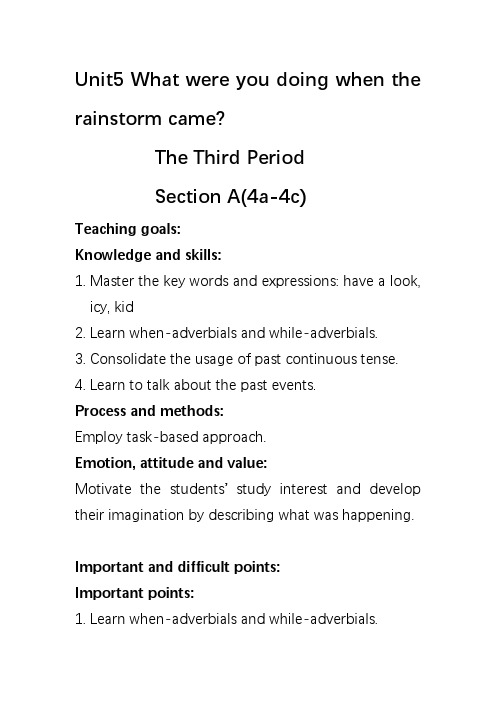
Unit5 What were you doing when the rainstorm came?The Third PeriodSection A(4a-4c)Teaching goals:Knowledge and skills:1.Master the key words and expressions: have a look, icy, kid2.Learn when-adverbials and while-adverbials.3.Consolidate the usage of past continuous tense.4.Learn to talk about the past events.Process and methods:Employ task-based approach.Emotion, attitude and value:Motivate the students’ study interest and developtheir imagination by describing what was happening.Important and difficult points:Important points:1.Learn when-adverbials and while-adverbials.2.Learn past continuous tense.Difficult points:1.Revise the past simple tense and learn to tell atories.2.Learn to talk about the past events.Teaching preparations:An English textbook and a projector.Teaching procedures:Step ⅠLead-inGreet the class as usual and check homework. Step ⅡPresentationGrammar Focus.First, ask students to read the sentences in the box with a partner.Give them several minutes to do this work.Then, invite some pairs to act out for the whole class and explain their meanings.Step ⅢPractice1.Teach Activity 4a.First, read the example sentences for the students, make them understand how to do this activity. Then, invite some students to read the phrases in the table and explain their meanings.Ask students to make sentences with while and when like the sample one.Give them several minutes to do this work.Later, invite some students to present their sentences. Correct mistakes if any.2.Teach Activity 4b.Give students several minutes to fill in the blanks using was, were, when, or while.Ask them to do this work individually and get the main idea of the passage.Later, invite some students to read their complete passage to check the answers.Step ⅣConsolidationTeach Activity 4c.T: Do you remember what you were doing at thesetimes last Sunday? Look at the table and fill in it. Then interview two classmates. Are you clear? Ok, do it please.After some time, the teachers says: Now I want you to make a conversation with your classmates according to the survey table. Give you a moment to prepare. If you are ready, put up your hands.Then ask some groups to talk about their day in the conversation before the whole class.Step ⅤSummaryIn this period, we mainly learned the usage of past continuous tense and how to talk about past events. Through the writing and speaking drills, we consolidated the target language and grammar. Step ⅥHomework1.Finish the exercises in the workbook.2.Preview the new words in Section B.Blackboard Design:Unit5 What were you doing when the rainstorm came?The Third PeriodPast continuous tenseWhen-adverbials and while-adverbials教学反思:本节课主要是语法课,学习过去进行时的用法以及when和while 引导的时间状语从句的用法。
- 1、下载文档前请自行甄别文档内容的完整性,平台不提供额外的编辑、内容补充、找答案等附加服务。
- 2、"仅部分预览"的文档,不可在线预览部分如存在完整性等问题,可反馈申请退款(可完整预览的文档不适用该条件!)。
- 3、如文档侵犯您的权益,请联系客服反馈,我们会尽快为您处理(人工客服工作时间:9:00-18:30)。
pick up=pick up the phone接电话
strange\ streɪndʒ\ adj奇怪的,奇特的
New words
•rainstorm 暴风雨 •alarm 闹钟 •go off 发出响声
•begin 开始(began)
•heavily 很大程度上,大量地 •pick up=pick up the phone接电话
What is the baby doing now?
He is watching TV.
He was palying computer games
I can summarize我会总结!
现在进行时 the present continuous tense
过去进行时 past progressive tense
I can speak我会说!
Can you talk about past events by using “was/were + doing”?
What was your sister doing when the rainstorm came?
She was reading books.
What was your brother doing at the time of the rainstorm?
注意
Pay attention to “was/were +doing”.
I can listen我会听!
1b Listen to the TV report and circle the correct responses.
a. doing my homework / studying b. playing basketball / reading c. going to work / waiting for the bus d. walking home / shopping
•strange 奇怪的
Presentation
There was a rainstorm yesterday. What were they doing when the rainstorm came? Here are some reports.
What were you doing when the rainstorm came?
1. 以when和while引导的时间状语从句
1) 延续性动词和非延续性动词 延续性动词指动作可以延续一段时间, 而不是 瞬间结束。 如: work、study、drink、eat等。 非延续性动词指动作极为短暂,瞬间结束。 如: start、begin、hit、jump、knock等。
2) 在本单元中, 出现了以when和while引导的 时间状语从句。
孩子们在海边捡到许多贝壳。
Pick that book up. 把那本书捡起来。
2) 搭载 e.g. The car stopped to pick me up.
汽车停下来接我。 We’ll send the ambulance to pick him up. 我们要派一辆救护车把他接走。
DO you know?
When it … He was doing…
When it walked on the street he was eating.
总结
1) when可指时间点, 又可指时间段, 从句中 可用延续性动词, 也可用非延续性动词。
2) while总是指一个时间段, 从句中必须用延 续性动词。
谢谢!
while表示“在……的时候”、“在……期间”。 它强调主句的动作与从句的动作同时发生或 主句的动作发生在从句的动作过程中。While 从句中必须是表示动作或状态的延续性动词。如:
The weather was fine while we were in Beijing . She called while I was out. 如果主句的动作在从句的动作过程中发生, 从句常用进行时。如: While we were swimming someone stole our clothes . Don’t talk so loud while others are working.
初中英语人教版八年级下册 Unit5课件
Words study rainstorm \ ′reɪnstɔ:m \n.暴风雨
alarm\ ə ′ lɑ:rm\n.闹钟 go off (闹钟)发出响声
begin\ bɪ ′ gɪn\ v.开始 (began\bɪ ′gæn \)
heavily \ ′hevɪli\ adv很大程度上,大量地
1. _b_ I was in the library. 2. _a_ I was in my house. 3. _d_ I was on the street. 4. _c_ I was at the bus stop.
Listening skill
What were they doing when the rainstorm came? Let’s listen.
when表示“当……的时候”。从句中既可用延续性 动词, 又可用非延续性动词, 这些动词既可以 表示动作, 又可表示状态。从句中的动作既可 和主句的动作同时发生, 又可在主句的动作之前 或之后发生。如:
Mary was having dinner when I saw her . The boy was still sleeping when his mother got home yesterday morning .
I was studying in the library.
Where were you when the rainstorm came?
I was on the street.
What were you doing when the rainstorm came?
I was watchingTV in my house.
1. I called at seven and you didn’t pick up. pick up(=pick up the phone) 接电话 pick up 还有以下含义: 1) 拾起;抱起
e.g. The children picked up many sea shells at the seashore.
Grammar Focus
What is the baby doing now?
What was the baby doing at that
time?
GRAMMAR FOCUS
GRAMMAR FOCUSHe is sleeping. He was sleeping.
What was he doing at 9:00 last night?
He w__a_s_d_o_i_n_g_h__is_h_o_m__e_w_o_r_k_.
What was your mother doing at the time of the rainstorm?
shew__a_s _c_o_o_k_in_g__________.
Guess:Where was the boy? What was he doing?
2a. Listen and number the pictures 1-5.
4
1
53Βιβλιοθήκη 22b. LGiusetesns:aHgaoiwn.tFoifllililninthteheblbalnaknsksininthtehesesnetnetnecnecsesin? 2a.
I _w__a_s_ so busy l_o_o__k_i_ng
含义: 表示现在 正在进行的动作。
结构: is/am/are + doing
含义: 表示过去某一时刻 或某一段时间正在
进行的动作。
结构: was/were + doing
★与特定的过去时间状语连用,常见的时间有:
at 9 last night, at this time, at that time, at that moment 等
the bus when it began to rain heavily.
3
2
I
_r_a_n__
to
the
bus
stop but I still
missed the bus.
when 7:00 p.m. 8:00 p.m. 9:00 p.m.
what help take sleep
where in the kitchen in the bathroom in the bedroom
What were you doing when the rainstorm came?
I was waiting for the bus at the bus stop.
1a Where were the people at the time of the rainstorm? Match the statements with the people in the picture.
I took a hot shower
for the umbrella that I didn’t see a car coming.
My alarm didn’t go
off so I _w__o_k_eup late.
and ____a_t_e_____
some warm food.
4
1
5
Iw_a__s_w__a_i_t_i_n_gfor
